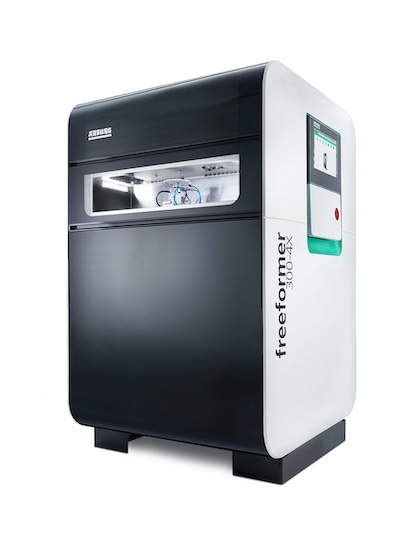Freeformer 300-4X with feed unit processes additive continuous fibers, additional axis enables local component reinforcement; Application example: Individual hand orthoses for the medical technology sector.
October 16, 2019

At the K 2019, Arburg is presenting interesting technological advances to its Freeformers for industrial additive manufacturing. For the first time, a Freeformer 300-4X is on show with a four-axis part carrier. This will enable completely new applications in the future Arburg Plastic Freeforming (APF). With the new machine, continuous fibers can be fed in and overmolded in plastic in order to locally reinforce functional parts.
|
For the Freeformer 300-4X, Arburg developed a fourth axis that enables rotational movement of the part carrier. This means that in future fiber-reinforced components can be produced additively in the APF process. |
“Our developers are continuously exploiting the potential of the Freeformer even further. While doing so, Arburg always stays true to customer requirements and wishes,” explains Lukas Pawelczyk, Head of Freeformer Sales at Arburg. “At the K 2019, we will therefore present for the first time a prototype Freeformer 300-4X, that manufactures fiber-reinforced components in the APF process with the help of a fourth axis. In November at the Formnext 2019 in Frankfurt, we will also be presenting this machine and other exciting new innovations.”
The Freeformer 300-4X was developed on the basis of the Freeformer 300-3X, and also has three discharge units. The new centrepiece is a four-axis part carrier. Not only does it move in the x-, y- and z-direction, but can also perform rotational movements thanks to the additional fourth axis. This means that with the new machine continuous fibers can be set down on the part carrier in any desired orientation, and then formed using plastic into fiber-reinforced durable functional parts. The glass or carbon fibers are fed from a roll and set down on the part carrier. They are immediately embedded with plastic and then cut to the desired length.
A typical example for such functional parts from the medical technology sector is hand orthoses. At the trade fair, a Freeformer 300-4X will produce such an orthosis in hard/soft combination with local reinforcement. It replaces the classical metal-reinforced product and can be individually adapted to the shape of the patient’s hand. The goal is to realise areas under heavier strain with fiber-reinforced PA, for example. To protect the hand, potential pressure marks are also prevented by using soft TPE.
The Freeformers cater for a wide range of industrial additive manufacturing applications. The Freeformer 300-3X can process three components into complex functional parts in a resilient hard/soft combination with support structure. The Freeformer can be used in the clean room and is particularly suited to applications in medical technology. If required, it can also be automated and integrated into complete production lines via optional interfaces.
All Freeformers work in the APF process using qualified standard granulates as a basis. Users can process their own original materials and optimise droplet size as well as process control themselves with the open system. Alternatively, they can access Arburg's material database with reference materials. Included here, for example, are also very soft TPU, PLLA, and FDA-certified materials for medical technology.
About the Author(s)
You May Also Like





